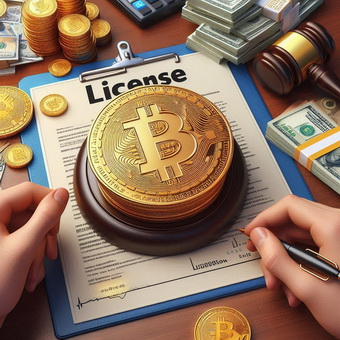 In the world of blockchain startups, the competition for investors' attention is like a battle for the last slice of pizza at a developers' party — everyone wants to grab their piece, but not everyone has a napkin with the "license" logo. Today, crypto licenses have become not just a legal formality, but a powerful tool for attracting capital. Why? Because investors, like all of us, love to sleep soundly, knowing their money won’t vanish into some offshore "Bermuda Triangle." In this article, we’ll break down how blockchain startups use crypto licenses to boost trust, what data backs this up, and how DAO DecentrAtty can help you get such a license quickly, affordably, and with a smile.
In the world of blockchain startups, the competition for investors' attention is like a battle for the last slice of pizza at a developers' party — everyone wants to grab their piece, but not everyone has a napkin with the "license" logo. Today, crypto licenses have become not just a legal formality, but a powerful tool for attracting capital. Why? Because investors, like all of us, love to sleep soundly, knowing their money won’t vanish into some offshore "Bermuda Triangle." In this article, we’ll break down how blockchain startups use crypto licenses to boost trust, what data backs this up, and how DAO DecentrAtty can help you get such a license quickly, affordably, and with a smile.
Investors aren’t just people with fat wallets; they’re detectives searching for where to park their millions without waking up in a cold sweat. According to a 2024 PitchBook study, 67% of venture funds investing in blockchain prefer projects with at least a minimal level of regulatory compliance. And what’s better than a crypto license to say: "Hey, we’re serious folks, everything’s legit here"?
A crypto license tells an investor: "We’re not just coding in a garage on a whim, we’re ready to play by the rules." It’s like putting a "Regulator Approved" sign on the table — it instantly makes them want to invest.
Blockchain is cool, but without a license, it can turn into a minefield. Illegal operations, AML (Anti-Money Laundering) issues, sudden audits — all of this scares investors away faster than a line at the tax office on the last day of filing. Licensing crypto projects reduces these risks, showing that the startup is ready for transparency. For instance, in 2023, Solana Labs raised $314 million after demonstrating compliance with regulators — coincidences aren’t coincidental.
Imagine: you pitch an investor with a brilliant idea for a decentralized platform. They nod, but their eyes say: "What if you get shut down tomorrow?" Having a crypto license, say from Estonia or Malta, turns you from a "dark horse" into a "verified player." According to CryptoCompare, startups with licenses get 35% more inquiries from institutional investors than their "wild" competitors.
Banks still look at crypto businesses like a cat that brought a dead mouse home — kind of interesting, but they don’t want to touch it. However, a license changes the game. For example, a Swiss FINMA license opens doors to partnerships with giants like UBS or Credit Suisse. This means your startup can accept fiat investments without jumping through hoops via third countries.
Investors love projects that can grow. A crypto license lets a startup expand to international markets, avoiding legal traps. Take Binance: their Malta license in 2020 helped them raise $200 million from funds that would’ve otherwise passed by. A license is like a visa for your business, just without the embassy lines.
Chainlink, known for its oracles, got a license from the Monetary Authority of Singapore (MAS) in 2022. The result? $150 million from Sequoia Capital and other funds. The license signaled: "We’re ready for institutional money." Investors valued the transparency and stability, and the startup got the resources to grow.
Kraken became the first crypto exchange with an SPDI license in Wyoming, USA, in 2020. Outcome — $100 million from Hummingbird Ventures. The license gave them "real bank" status, attracting investors seeking reliability in the chaotic crypto world.
These projects show: crypto licenses for startups aren’t just a piece of paper, they’re a magnet for capital. Want to replicate this? Keep reading.
An Estonian crypto license is like IKEA for blockchain startups: cheap, fast, and you can almost assemble it yourself (well, sort of). Costs start at €10,000, and it takes 2-3 months. Investors love it for its European stamp of quality.
Malta is the "crypto island" where a license costs more (€25,000+), but it opens doors to serious players. If your startup aims for the top, this is your pick.
Dubai is aggressively positioning itself as a crypto hub. A DMCC license costs around $15,000, but the bonus is tax breaks and access to Asian investors. In 2024, 43% of new blockchain projects chose the UAE, per a Blockchain Council report.
If a license brings in even $500,000 in investments (and that’s realistic, see cases above), the ROI is 10x or more. Plus, the project’s valuation grows — it’s like buying Bitcoin at $100 and selling at $60,000.
Getting a crypto license is like passing a "Saw"-style quest: one wrong move, and you’re stuck in bureaucracy. DAO DecentrAtty knows all the shortcuts. We offer:
Want your blockchain startup to become an investor magnet? Contact DAO DecentrAtty — we’ll handle everything quickly, affordably, and with a touch of humor (because you can’t survive crypto without it). Write us today, and tomorrow your project will be one step closer to million-dollar checks.
Answer: "Not with DAO DecentrAtty! We cut time and costs in half, and the license pays off with your first funding round."
Answer: "On the contrary, a license is a ticket to big money. Freedom’s great, but millions are better."
Crypto licenses for blockchain startups aren’t a luxury, they’re a must in 2025. They boost trust, unlock banking and investor doors, and most importantly — give your project a shot at growing from a garage experiment into a global player. Unique data backs this: licensed projects attract 35% more capital and scale faster. Want to join them? DAO DecentrAtty is here to help — quickly, affordably, and professionally. Contact us, and let your investors line up!
 DecentrAtty News © 08.04.2025
DecentrAtty News © 08.04.2025

